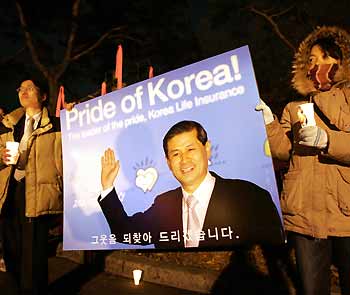A team led by a once-heralded and now disgraced South Korean scientist faked
two landmark papers on embryonic stem cells but did produce the world's first
cloned dog, an investigation panel said yesterday.
The panel at Seoul National University told reporters data was deliberately
fabricated in papers produced by the team led by scientist Hwang Woo-suk. It
described the case as scandalous.

South
Korean supporters of compatriot stem-cell scientist Hwang Woo-suk,
participate in a candle light vigil in front of Seoul National University
in Seoul January 9, 2006.
[Reuters]
|
Medical researchers say the episode
which has shocked and shamed many South Koreans who had dubbed Hwang a hero is
one of the biggest cases of scientific fraud in recent history.
"These individuals cannot be regarded to represent science in Korea," the
panel said in an English-language statement.
The two papers finally debunked yesterday were a 2004 report on producing the
first cloned human embryos for research and a 2005 paper on producing the first
embryonic tailored stem cells. Both reports were published in the US periodical
Science.
"Hwang's team did not have the data for the stem cell lines in the 2004
paper, but fabricated it," Chung Myung-hee, the head of the panel, told
reporters.
Chung reiterated a finding in an interim report in late December that there
was no data to prove Hwang's team produced tailored stem cells, as it claimed in
the May 2005 paper.
That paper caused a sensation because the findings raised hopes that
embryonic stem cells could one day be used to create genetically-specific tissue
to treat ailments such as severe spinal cord injuries and Parkinson's disease.
"We concluded that Professor Hwang's team did not have patient-specific stem
cell lines and did not have any scientific basis that the team made them," the
panel said.